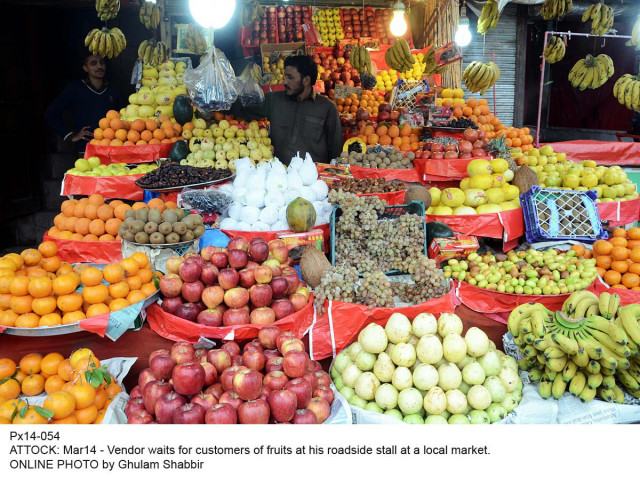November 2017: Inflation rises 4% due to hike in both food and non-food prices
Core inflation touches three-month high at 5.5%

Food inflation picked up by 2.4% in November 2017 whereas non-food inflation jumped 5.1%. PHOTO: ONLINE
Measured by the Consumer Price Index (CPI), the inflation had stood at 3.8% a month earlier, according to the national data collecting agency.
Food inflation picked up by 2.4% whereas non-food inflation rose 5.1%. Prices of non-food items, which had largely remained stable earlier except for the cost of health and education, recorded the increase after the government started enhancing petroleum product prices.
Average inflation rate for the first five months (July-November) of the current fiscal year rose 3.6%, but it was lower than the pace recorded in the same period of previous year.
On a year-on-year basis, the non-food non-energy inflation, called core inflation, hit a three-month high at 5.5% in November. Earlier in August this year, the core inflation had stood at 5.5%.
Food price stability slows down pace of inflation
Among 89 commodity groups in the CPI, the core inflation covers price movements in 43 goods. The State Bank of Pakistan (SBP) monitors core inflation while formulating its monetary policy.
Core inflation is gradually going up due to a surge in the cost of health, education, transport and housing. The cost of health services went up about 10% in November than a year ago. Education cost increased 12.4%.
The central bank's latest report on the state of economy predicts that the government will be able to meet its 6% inflation target for the current fiscal year. The assumption is based on expectations of better supply conditions for food commodities, limited pass-through of international oil prices to the domestic market, a steady increase in domestic demand and improving consumer confidence in the economy, as reflected in results of the IBA-SBP Consumer Confidence Survey for July 2017.
The PBS inflation numbers showed that on a yearly basis, onion prices swelled 187%, tomatoes became expensive by 107.5%, rice cost 14% more and eggs gained 13%.
September 2017: Inflation surges to 3.9% as price shocks shake up commodities
Betel leave and nut prices increased over 11%, tea rates jumped 10.7%, meat prices rose 7.3%, cooked food prices gained 6.4% and fresh fruits cost 6.3% more.
Pulse gram prices fell 28.4%, mash pulse prices went down 28%, sugar lost 25.6% and masoor and moong pulse prices decreased over 20%.
Among non-food items, prices of drugs and medicines increased 15%, education 12.4% and motor fuel 11.8%. Kerosene oil cost 10.3% more after Prime Minister Shahid Khaqan Abbasi decided to reverse a four-year-old policy of keeping prices of the poor man's fuel almost static.
Construction wage rates increased over 7%, tailoring became 8% expensive, house rent rose 6.5%, cleaning and laundry cost increased 6.6% and medical tests' cost went up 7.2%.



















COMMENTS
Comments are moderated and generally will be posted if they are on-topic and not abusive.
For more information, please see our Comments FAQ